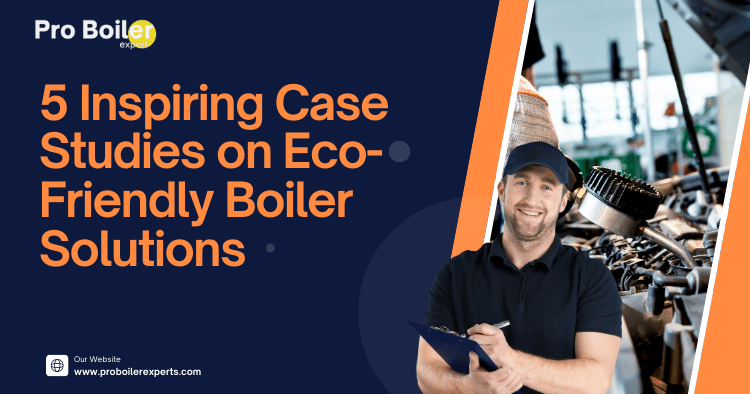Table of Contents
- Introduction
- Case Study 1: The Green City Initiative
- Case Study 2: EcoBoiler Solutions in a Manufacturing Plant
- Case Study 3: Residential Energy Efficiency in Urban Areas
- Case Study 4: Innovations in Industrial Heating
- Case Study 5: Community-Driven Renewable Energy Projects
- Conclusion
- FAQs
Introduction
As the world pivots towards sustainable practices, the heating industry is no exception. Eco-friendly boiler solutions are becoming increasingly popular, not only for their environmental benefits but also for their efficiency and cost-effectiveness. In this blog post, we’ll explore five inspiring case studies that highlight how various organizations implemented eco-friendly boiler solutions. These examples serve as a beacon of hope and innovation, encouraging others to follow suit.
“Every small step counts towards a more sustainable future.”
Case Study 1: The Green City Initiative
In 2021, a city in the Pacific Northwest launched the Green City Initiative, aimed at reducing carbon emissions by 40% by 2030. One of its key components was the replacement of old, inefficient boilers in municipal buildings with state-of-the-art eco-friendly alternatives.
Implementation
The city partnered with EcoHeat Solutions to install biomass boilers that utilized locally sourced wood pellets. These boilers not only reduced greenhouse gas emissions by 60% but also provided a stable and renewable energy source.
Results
- Cost Savings: The city saw a 30% reduction in energy bills within the first year.
- Community Engagement: Local residents were involved in the biomass sourcing process, fostering a sense of community.
Overall, the initiative has inspired neighboring towns to adopt similar eco-friendly practices.
“Community engagement can amplify the impact of sustainability initiatives.”
Case Study 2: EcoBoiler Solutions in a Manufacturing Plant
In 2020, a major manufacturing plant in the Midwest faced increasing pressure to improve its sustainability practices. They turned to EcoBoiler Solutions, which specializes in high-efficiency boiler systems.
Implementation
The plant installed a high-efficiency condensing boiler system, which uses advanced technology to recover heat from exhaust gases. This system was integrated with their existing steam network.
Results
| Metric | Before Installation | After Installation |
|---|---|---|
| Annual Fuel Consumption (gallons) | 50,000 | 30,000 |
| CO2 Emissions (tons/year) | 200 | 100 |
| Energy Efficiency (%) | 75% | 95% |
The new eco-friendly boiler cut fuel consumption by 40% and significantly improved the plant’s energy efficiency, leading to substantial cost savings.
“Efficiency improvements translate not only to cost savings but also to a healthier planet.”
Case Study 3: Residential Energy Efficiency in Urban Areas
A non-profit organization in New York City, Urban Green, focused on improving residential energy efficiency in low-income neighborhoods by replacing old boilers with eco-friendly options.
Implementation
Urban Green partnered with local contractors to retrofit existing buildings with energy-efficient gas boilers that meet ENERGY STAR standards. They also offered financial assistance to homeowners.
Results
- Improved Living Conditions: Residents reported better heating and lower utility bills.
- Environmental Impact: The project was estimated to reduce emissions by 150 tons of CO2 annually across the participating homes.
This initiative not only enhanced the quality of life for residents but also served as a model for similar programs in cities across the country.
“Improving energy efficiency can directly enhance the quality of life for communities.”
Case Study 4: Innovations in Industrial Heating
A global food processing company, Fresh Foods Inc., sought to enhance its sustainability profile by upgrading its heating systems across multiple plants.
Implementation
The company opted for a combination of solar thermal and biomass heating systems. They integrated these systems with existing gas boilers to create a hybrid solution that maximized efficiency.
Results
| Plant Location | Total Energy Savings (%) | CO2 Reduction (tons/year) |
|---|---|---|
| Plant A | 50% | 300 |
| Plant B | 45% | 250 |
| Plant C | 55% | 350 |
The hybrid systems allowed Fresh Foods Inc. to cut energy costs significantly while aligning with their corporate sustainability goals.
“Innovation in energy systems can significantly reduce operational costs while benefiting the environment.”
Case Study 5: Community-Driven Renewable Energy Projects
In a small town in Vermont, citizens banded together to create a community boiler system powered by renewable energy sources.
Implementation
The community established a co-op that funded the installation of a central biomass boiler, serving multiple residential and commercial buildings. The project was supported by grants from Renewable Energy Vermont.
Results
- Community Ownership: Residents reported a strong sense of ownership and responsibility towards the boiler system.
- Economic Benefits: The project created local jobs and stimulated the economy by keeping energy dollars within the community.
This case study exemplifies how grassroots efforts can lead to significant environmental and economic benefits.
“Community-driven projects highlight the power of collective action in sustainability.”
Conclusion
The journey towards eco-friendly boiler solutions is filled with inspiring stories of innovation and community spirit. From urban initiatives to industrial transformations, these case studies show that sustainable practices are not only possible but also beneficial for everyone involved. As we continue to face climate challenges, these examples remind us that every small step counts towards a more sustainable future.
“Together, we can make a difference in the fight against climate change.”
FAQs
1. What are eco-friendly boilers?
Eco-friendly boilers are heating systems designed to minimize environmental impact. They often use renewable energy sources, such as biomass or solar power, and feature advanced technologies that improve efficiency.
2. How can I find an eco-friendly boiler for my home?
Start by researching local suppliers who specialize in energy-efficient systems. Websites like Energy.gov offer resources and guidelines to help you choose the right boiler.
3. Are eco-friendly boilers more expensive than traditional ones?
While the initial investment may be higher, eco-friendly boilers often lead to significant savings on energy bills and lower maintenance costs over time.
4. Can businesses benefit from eco-friendly boilers?
Absolutely! Many businesses have found that switching to eco-friendly boilers not only reduces their carbon footprint but also enhances their brand reputation and reduces operational costs.
For more insights on eco-friendly heating solutions, check out our articles on the Top 5 Benefits of Biomass Boilers for Eco-Friendly Heating and the Top 5 Eco-Friendly Boilers for Sustainable Heating.





